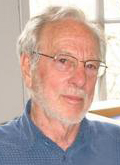Charles H. Kahn, Philosophy
 Charles H. Kahn, a landmark scholar on ancient Greek philosophy and a professor emeritus of philosophy in the School of Arts and Sciences, died on March 5. He was 94.
Charles H. Kahn, a landmark scholar on ancient Greek philosophy and a professor emeritus of philosophy in the School of Arts and Sciences, died on March 5. He was 94.
Born in Louisiana, Dr. Kahn enrolled in the University of Chicago at age sixteen, where he completed his bachelor’s and master’s degrees. He then went on to study at the Sorbonne in Paris, then completed his doctorate in classical studies at Columbia University in 1958. After graduating, he joined Columbia’s faculty, serving as an assistant and then associate professor of classics until 1965, when he was recruited to join Penn. That year, he was appointed an associate professor of philosophy in the School of Arts and Sciences. In 1968, he was promoted a full professor, a position he retained until his retirement in 2012 (an occasion that was marked by a conference in his honor). At Penn, Dr. Kahn was an active presence in governance, serving on the Faculty Senate and several of its committees. In addition to chairing Penn’s philosophy department, he held visiting appointments at other major universities, including Harvard, Cambridge, and Oxford.
Dr. Kahn was a leading scholar in ancient Greek philosophy, particularly on Presocratics (in the early decades of his career) and on Plato (in later decades). His doctoral dissertation, which was published as a book, Anaximander and the Origins of Greek Cosmology (Columbia University Press 1960), was a groundbreaking contribution to the study of pre-Socratic philosophy and remains the definitive work on the subject. His other books on the Presocratics include The Art and Thought of Heraclitus: An Edition of the Fragments with Translation and Commentary (Cambridge University Press 1979), now considered the standard interpretation of that work, and Pythagoras and the Pythagoreans. A Brief History (Hackett, 2001), which was intended for the non-scholarly public.
In 1973, Dr. Kahn published The Verb “Be” in Ancient Greek (Reidel, Dordrecht), in which he delved into usage of the verb “to be” in ancient Greek, discovering uses and subtle nuances that had escaped the attention of scholars. The book provoked numerous debates and responses over the years, and in 2009, Oxford University Press published a collection of Dr. Kahn’s articles in reply to those responses, Essays on Being. Dr. Kahn’s later books Plato and the Socratic Dialogue (Cambridge University Press 1996) and Plato and the Post-Socratic Dialogue: Return to the Philosophy of Nature (Cambridge University Press 2013) had significant impact on Platonic studies and sparked significant academic debate, marking him as one of the most important contemporary Platonists.
Due to his eminence in philosophy and classical studies, Dr. Kahn served as editor or on the editorial board of several philosophical journals, as president of the Society for Ancient Greek Philosophy (1976-8), as vice president of the American Philosophical Association (1997), and as a fellow of the American Academy of Arts and Sciences (2000). He received major research grants from the American Council of Learned Societies, the National Endowment for the Humanities, and the Guggenheim Foundation, as well as several University Research Foundation (URF) grants from Penn.
Dr. Kahn is survived by his wife; a sister; four daughters; a son; and ten grandchildren.
